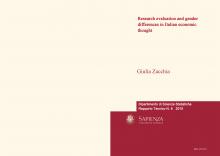Autore:
G. Zacchia
Abstract:
We contribute to the analysis of recent changes in scientific productivity and research topics in economics, focusing on the Italian case. We compare the strategies used by men and women within the Italian academia in the face of significant changes in the governance of universities and in the practices and indicators of research evaluation.
Despite the progressive feminization of PhDs in economics, the share of women working as academic staff in economics departments at Italian universities is still low: women constitute 30% of academic economists, accounting for 17.4% of full professors, 30% of associate professors, while in the lower ranks they represent the 47% of researchers nowadays.
Recent reforms of the Italian university system introduced new rules for accessing academic positions, placing more weight on research evaluation. Following a well-known international trend, this has increased the use of bibliometric indicators for the purposes of selection, creating a progressively competitive environment heavily founded on rigid standardized, maybe biased, indexes of scientific productivity. In this context, recent studies investigate gender differences in the willingness to enter competition. By contrast we aim at describing which have been the trends and strategies adopted by women economists to compete for academic position in Italy with their male colleagues, in order to find out which strategies have been adopted.
Specifically we focus on two main paths: “segregation”, i.e. women’s specialization in those areas of research less adopted among their male colleagues; “homologation”, i.e. a convergence of interests on the same fields of the male colleagues, more "visible" and therefore more easily measurable by bibliometric indexes.
Parole Chiave:
economics, Italy, research evaluation, research policy
Tipo di pubblicazione:
Rapporto Tecnico
Codice Pubblicazione:
6
Contatto:
ISSN:
2279-798X


